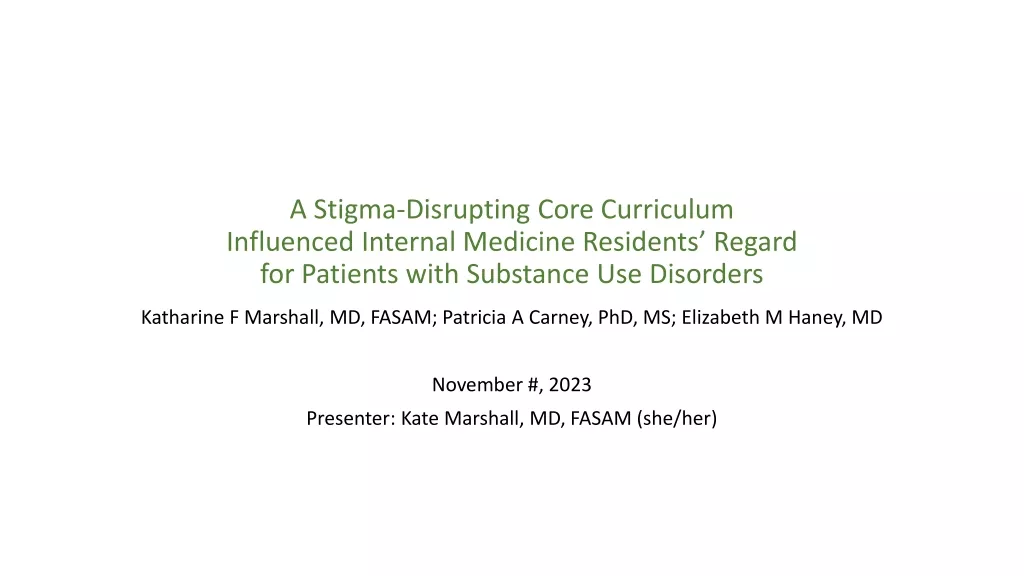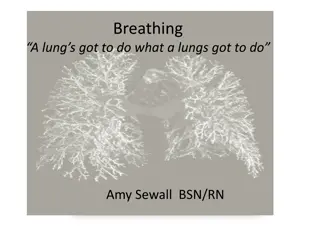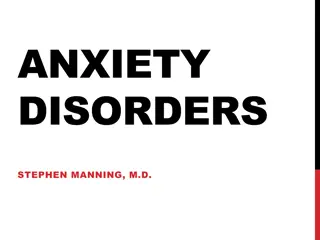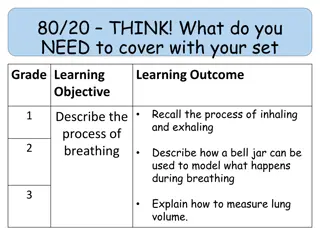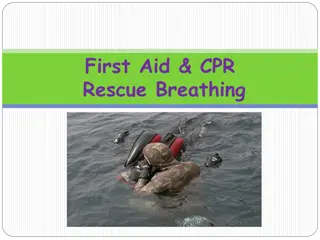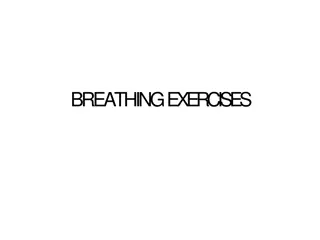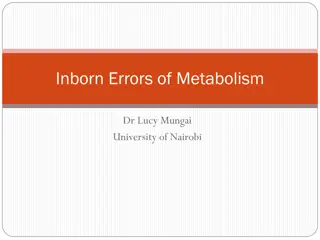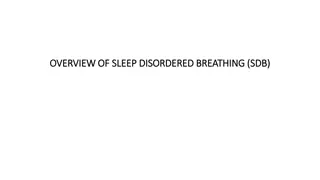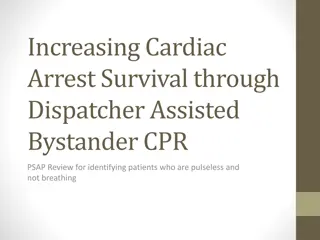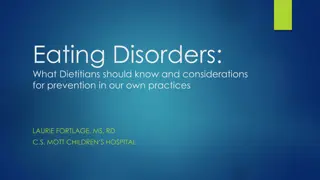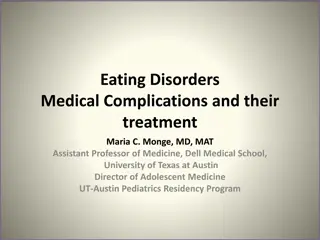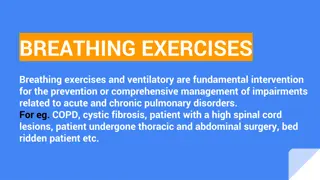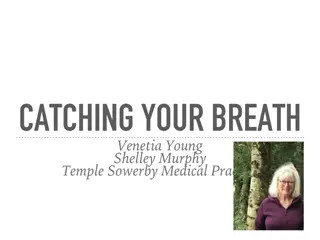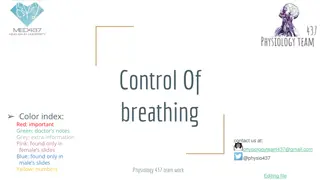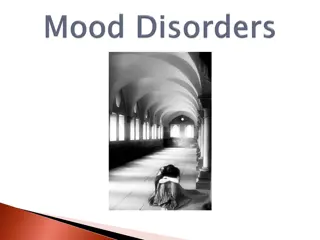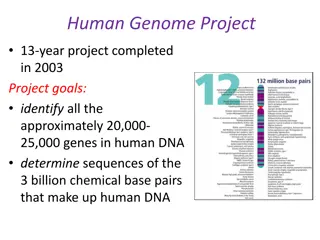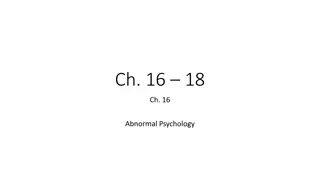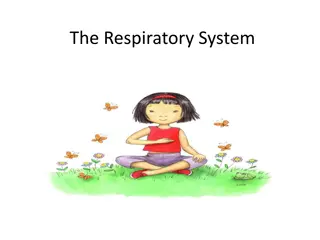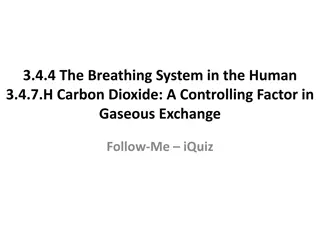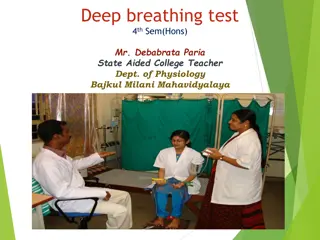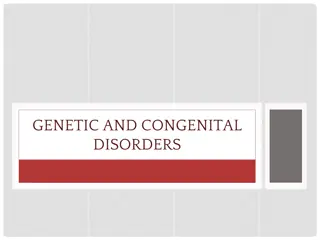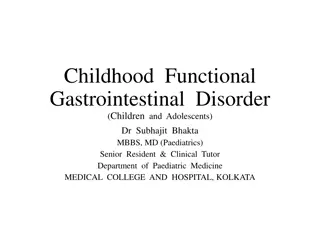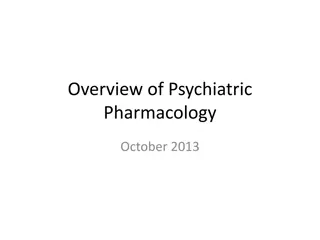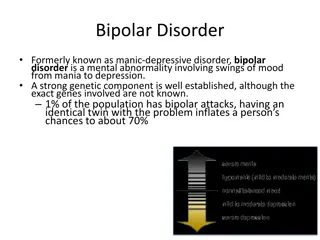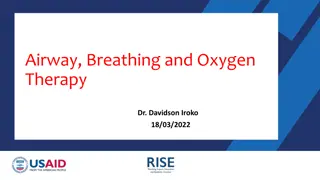Gynecological disorders
Common gynecological disorders including menstrual disorders and abnormal uterine bleeding. Find out about the nursing role in diagnosing and treating these disorders.
3 views • 22 slides
Enhancing Internal Medicine Residents' Approach to Patients with Substance Use Disorders
This study focuses on developing and implementing a stigma-disrupting curriculum to improve internal medicine residents' attitudes and knowledge regarding patients with substance use disorders. By addressing provider stigma and enhancing preparedness, the aim is to promote positive regard and increa
1 views • 27 slides
Exploring Mental Health Categories and Disorders
In today's categories, we delve into themes like stigma, recovery, myths, and facts surrounding mental health. We discuss various disorders including psychotic disorders and observable signs like hallucinations, delusions, and flat affect. Discover the signs and symptoms of mood disorders and high/l
1 views • 71 slides
Understanding Breathing, Anxiety, and Stress Management
Explore the crucial role of breathing in supplying oxygen to the body and expelling carbon dioxide, learn about anxiety disorders affecting millions, understand stress and its impact on health, and discover effective stress management techniques like setting boundaries and seeking social support. Re
2 views • 17 slides
Understanding Sleep Studies in Achondroplasia: Which? When? Why? Minutes
There is currently no protocol for screening and managing sleep-disordered breathing in individuals with achondroplasia. This study explores different types of sleep-disordered breathing in both childhood and adulthood, discusses various assessment techniques, evaluates proactive vs reactive managem
7 views • 12 slides
Overview of Human Genetic Disorders
Human genetic disorders encompass a range of conditions, from recessive disorders like cystic fibrosis to dominant disorders such as Huntington's disease. Examples include cystic fibrosis, Huntington's disease, and sickle-cell anemia. Understanding genetic disorders involves research and awareness o
0 views • 10 slides
Understanding Anxiety Disorders in DSM-5
Anxiety disorders encompass a range of conditions, from separation anxiety to social phobia and generalized anxiety disorder. The DSM-5 has re-conceptualized these disorders, grouping OCD in its own category and moving PTSD to trauma-related disorders. Recognizing symptoms and seeking appropriate tr
1 views • 96 slides
Understanding Anxiety Disorders and Related Conditions
Explore the distinguishing features of anxiety disorders such as generalized anxiety disorder, panic disorder, and phobias, along with insights into obsessive-compulsive disorder (OCD) and posttraumatic stress disorder (PTSD). Delve into the impact of conditioning, cognition, and biology on these co
2 views • 46 slides
Overview of Anxiety and Related Disorders
Anxiety disorders, such as PTSD, panic disorders, phobias, agoraphobia, and OCD, are characterized by varying degrees of fear and distress. Anxiety is a normal response to danger, but when it becomes chronic, it can lead to debilitating conditions. PTSD occurs post-trauma, panic disorders involve in
1 views • 42 slides
Understanding the Process of Breathing: Inhaling and Exhaling Explained
Explore the intricate process of breathing, from inhaling to exhaling. Discover how the respiratory system works, model breathing using a bell jar, measure lung volume, and assess your understanding through engaging activities and assessments.
1 views • 18 slides
Understanding Somatic Symptom Disorders, Conversion Disorders, and Dissociative Disorders
Somatic symptom disorders manifest as physical symptoms without apparent cause, while conversion disorders involve specific physical symptoms incompatible with medical conditions. Illness anxiety disorder involves interpreting normal sensations as disease symptoms. Dissociative disorders lead to a s
1 views • 41 slides
First Aid & CPR Rescue Breathing Techniques
Learn essential steps for providing first aid and CPR rescue breathing in emergency situations. Understand the procedures for rescue breathing on adults, children, and infants, including checking, calling for help, and administering rescue breaths effectively. Practice these life-saving techniques t
0 views • 15 slides
Understanding the Importance of Breathing Exercises in Respiratory Management
Breathing exercises, also known as ventilatory training, play a crucial role in improving pulmonary status, enhancing endurance, and increasing overall functionality in daily activities. These exercises help retrain respiratory muscles, improve ventilation, reduce breathing effort, enhance gas excha
0 views • 32 slides
Understanding Inborn Errors of Metabolism and Metabolic Disorders
Inborn Errors of Metabolism (IEM) are genetic disorders that disrupt metabolic pathways, leading to substrate accumulation or product deficiency. These disorders can be classified based on toxic accumulation, protein metabolism, carbohydrate intolerance, lysosomal storage issues, energy production d
0 views • 29 slides
Understanding Co-occurring Mental and Physical Health Conditions
Co-occurring mental and physical health disorders are prevalent and require an integrative multidisciplinary approach for effective assessment and treatment. This holistic approach helps address the complexity of managing multiple disorders in an integrated healthcare setting. Through a multi-direct
1 views • 37 slides
Understanding Sleep Disordered Breathing (SDB) and Sleep Apnea
Sleep Disordered Breathing (SDB) encompasses various breathing difficulties during sleep, including Obstructive Sleep Apnea (OSA) and Central Sleep Apnea. These disorders can lead to serious health issues but are manageable. OSA, a common type of SDB, poses risks to cardiovascular and cerebrovascula
0 views • 21 slides
Understanding Functional GI Disorders: A Comprehensive Overview
Functional GI disorders encompass a range of conditions affecting the gastrointestinal system, such as irritable bowel syndrome and disorders of the gut-brain interaction. These disorders are characterized by no structural abnormalities but are influenced by factors like motility disturbance, viscer
0 views • 42 slides
Understanding Genetic Disorders and Their Impact on Health
Genetic disorders are caused by abnormalities in genes or chromosomes, leading to various health conditions. Inherited disorders can be passed down from parents to children, affecting physical makeup and processes in the body. In India, there is a high prevalence of genetic disorders, particularly i
1 views • 12 slides
Enhancing Cardiac Arrest Survival Through Dispatcher-Assisted Bystander CPR
This presentation emphasizes the importance of dispatcher-assisted bystander CPR in identifying pulseless, non-breathing patients to improve cardiac arrest survival rates. Highlighting the need for community involvement, it showcases the impact of prompt response and effective CPR on increasing surv
0 views • 10 slides
Understanding Eating Disorders: Types, Signs, Effects, and Recovery
Eating disorders are mental disorders characterized by unhealthy eating habits and can have severe physical and psychological consequences. This article explores the definition of eating disorders, signs to look out for, different types such as Anorexia Nervosa, Bulimia Nervosa, Pica, and Purging Di
0 views • 10 slides
Understanding Eating Disorders: Insights for Dietitians
Eating disorders are complex neurobiological conditions that are not merely about control or weight management. These disorders can affect individuals of all genders, body sizes, and socioeconomic backgrounds. Dietitians play a crucial role in identifying, assessing, and treating eating disorders, a
0 views • 41 slides
Understanding Eating Disorders: Medical Complications and Treatment
This presentation by Dr. Maria C. Monge covers the common eating disorders in teenage patients, potential medical complications, and the role of the medical team in treatment. It includes definitions of disorders like Anorexia Nervosa, Bulimia Nervosa, and Binge Eating Disorder according to DSM-5 cr
0 views • 60 slides
Understanding Respiration and Breathing Process
Respiration is the vital process of inhaling and exhaling air to facilitate the exchange of oxygen and carbon dioxide in the body. It involves external and internal respiration, with mechanisms such as costal and diaphragmatic breathing. The regulation of breathing is controlled by the respiratory c
0 views • 21 slides
Breathing Exercises for Pulmonary Health
Breathing exercises are essential interventions for managing pulmonary disorders like COPD, cystic fibrosis, and post-operative complications. They help improve ventilation, cough effectiveness, muscle strength, and reduce stress. Different types of exercises like diaphragmatic breathing and pursed
0 views • 13 slides
Enhancing Wellness Through Breathwork Workshop
Explore the profound impact of breathing on overall health and learn effective techniques for symptom control and stress management. Meet experts like Venetia Young and Shelley Murphy who share insights on breathing practices and their benefits. Dive into topics such as childhood asthma, yoga for we
0 views • 21 slides
Understanding Neurodevelopmental Disorders in Childhood and Adolescence
Neurodevelopmental disorders in childhood and adolescence encompass a range of conditions including intellectual disabilities, communication disorders, autism spectrum disorder, and attention deficit/hyperactivity disorder. These disorders impact cognitive development, adaptive functioning, and comm
0 views • 30 slides
Understanding Sleep Disorders: Classification and Diagnosis
Sleep disorders encompass various conditions affecting sleep patterns and quality. They are classified into categories such as insomnia, sleep-related breathing disorders, central disorders of hypersomnolence, circadian rhythm sleep-wake disorders, parasomnias, and sleep-related movement disorders.
0 views • 32 slides
Understanding the Control of Breathing and Respiratory Rhythm
The content delves into the intricacies of the control of breathing, emphasizing the role of the medulla oblongata in regulating respiratory activity. It explores factors modifying breathing patterns, respiratory consequences of changing PO2, PCO2, and pH, and the functions of central and peripheral
0 views • 16 slides
Understanding Grief and Depressive Disorders: A Comparative Analysis
Grief and depressive disorders share similarities but also have distinct differences. Grief is a universal emotional state following loss, while depressive disorders involve prolonged mood disturbances. The stages of grief include denial, anger, bargaining, depression, and acceptance, with intervent
0 views • 79 slides
Understanding Genetic Disorders and the Human Genome Project
The Human Genome Project, completed in 2003, aimed to identify all human genes and DNA sequences. Genetic disorders, like autosomal disorders and Huntington's disease, can result from mutations at different levels, affecting single genes, chromosomes, or multiple genes. Albinism and cystic fibrosis
0 views • 37 slides
Understanding Abnormal Psychology: Disorders, Symptoms, and Treatments
Explore the world of abnormal psychology through the lens of different disorders like depression, anxiety, and phobias. Learn about the definitions of abnormal behavior, DSM-V classifications, and various types of psychological disorders. Delve into the complexities of mental health conditions such
0 views • 39 slides
Understanding the Respiratory System and Importance of Breathing
Explore the intricacies of the respiratory system, how breathing sustains life by delivering oxygen to cells, and the journey of air from the nose to the lungs. Discover how the diaphragm and other muscles facilitate breathing, enabling the exchange of oxygen in the air sacs for the bloodstream. Gra
0 views • 13 slides
Understanding the Breathing System in Humans
Explore the intricacies of the human breathing system, including the role of carbon dioxide in gaseous exchange. Test your knowledge with interactive quizzes and learn about the functions of different respiratory components such as the larynx and trachea. Dive into topics like breathing rates, gas e
0 views • 50 slides
Overview of Classification of Psychiatric Disorders
Psychiatric disorders are illnesses with various manifestations that impact functioning due to disturbances in biological, social, genetic, and other factors. Two key classification systems, ICD-10 and DSM-5, categorize over 200 types of psychiatric illnesses. The ICD-10 includes categories like org
0 views • 18 slides
Understanding Deep Breathing Tests for Autonomic Nervous System Evaluation
Deep breathing tests are an essential tool for evaluating autonomic nervous system function. They involve controlled breathing patterns to observe changes in heart rate, providing valuable insights into cardiac and vagal nerve responses. These tests are used for various purposes, including assessing
0 views • 22 slides
Overview of Genetic and Congenital Disorders and Their Causes
Explore the terminology, causes, characteristics, and results of genetic and congenital disorders, as well as the disorders of single-gene inheritance. Learn about autosomal dominant disorders like Marfan Syndrome and Neurofibromatosis. Discover how single-gene disorders are inherited and their impa
0 views • 24 slides
Understanding Childhood Functional Gastrointestinal Disorders
Functional Gastrointestinal Disorders (FGIDs) in children and adolescents are characterized by chronic or recurring symptoms that cannot be fully explained by current structural or biochemical tests. These disorders emphasize the role of normal development in symptom presentation and the lack of evi
0 views • 46 slides
Overview of Psychiatric Pharmacology: A Comprehensive Guide from 2013
This presentation delves into the nuances of psychiatric pharmacology, exploring common psychiatric conditions, historical perspectives on medical treatments, categories of psychiatric medications, and principles of treatment. It also touches on mental illness definitions from DSM-IV-TR and DSM-V, a
0 views • 27 slides
Understanding Mental Health Disorders: Bipolar Disorder, Anxiety Disorders, & More
Exploring various mental health disorders such as Bipolar Disorder, Anxiety Disorders, Generalized Anxiety Disorder, Panic Disorder, and Phobic Disorders. Learn about their symptoms, prevalence, and impacts on individuals' lives.
0 views • 41 slides
Airway, Breathing, and Oxygen Therapy - ABCDE Approach Overview
ABCDE approach is a systematic method for evaluating acutely ill patients to identify and address life-threatening conditions promptly. This presentation focuses on the Airway and Breathing components, emphasizing the assessment, management, and interventions to maintain a clear airway and adequate
0 views • 18 slides

